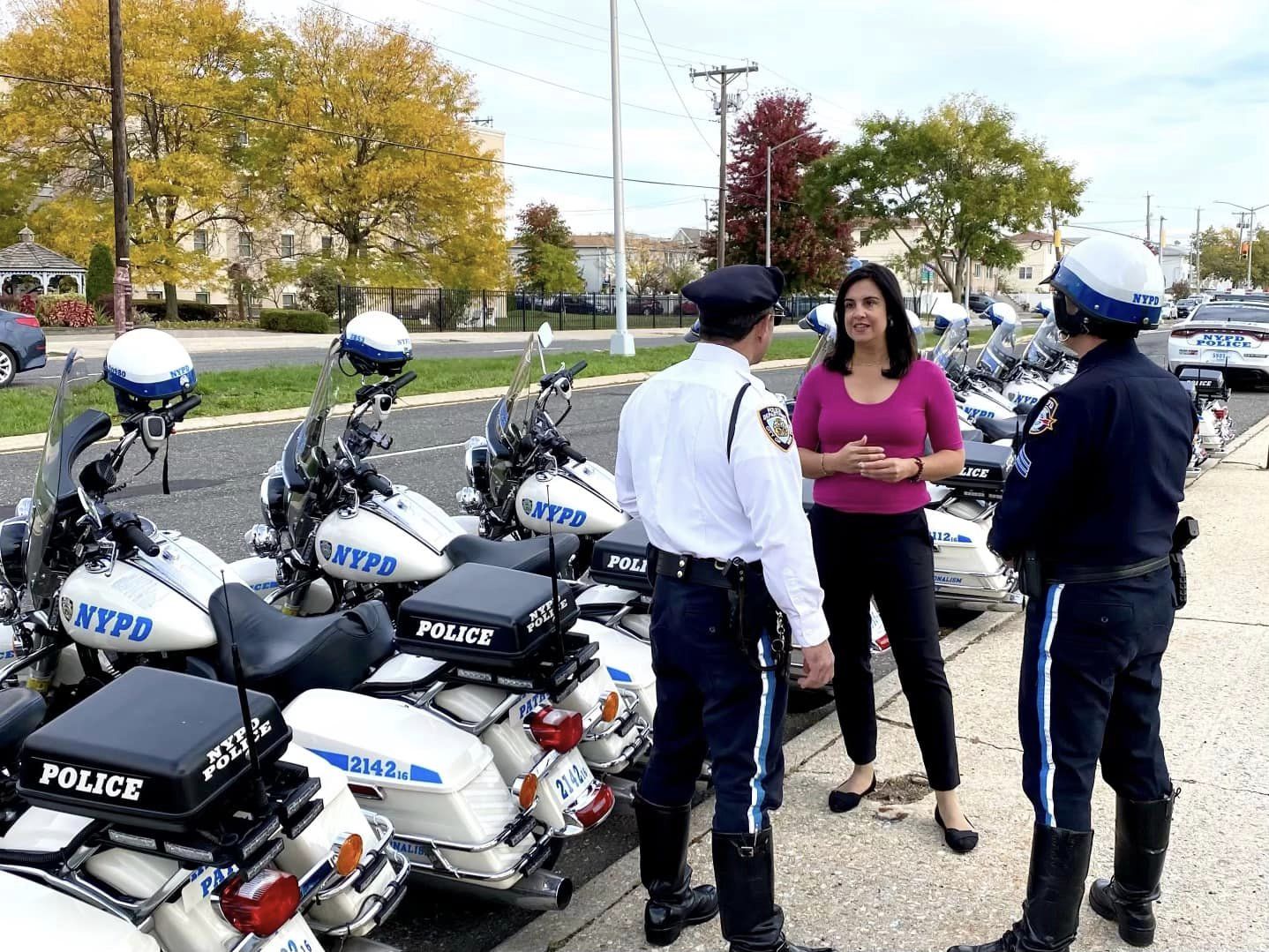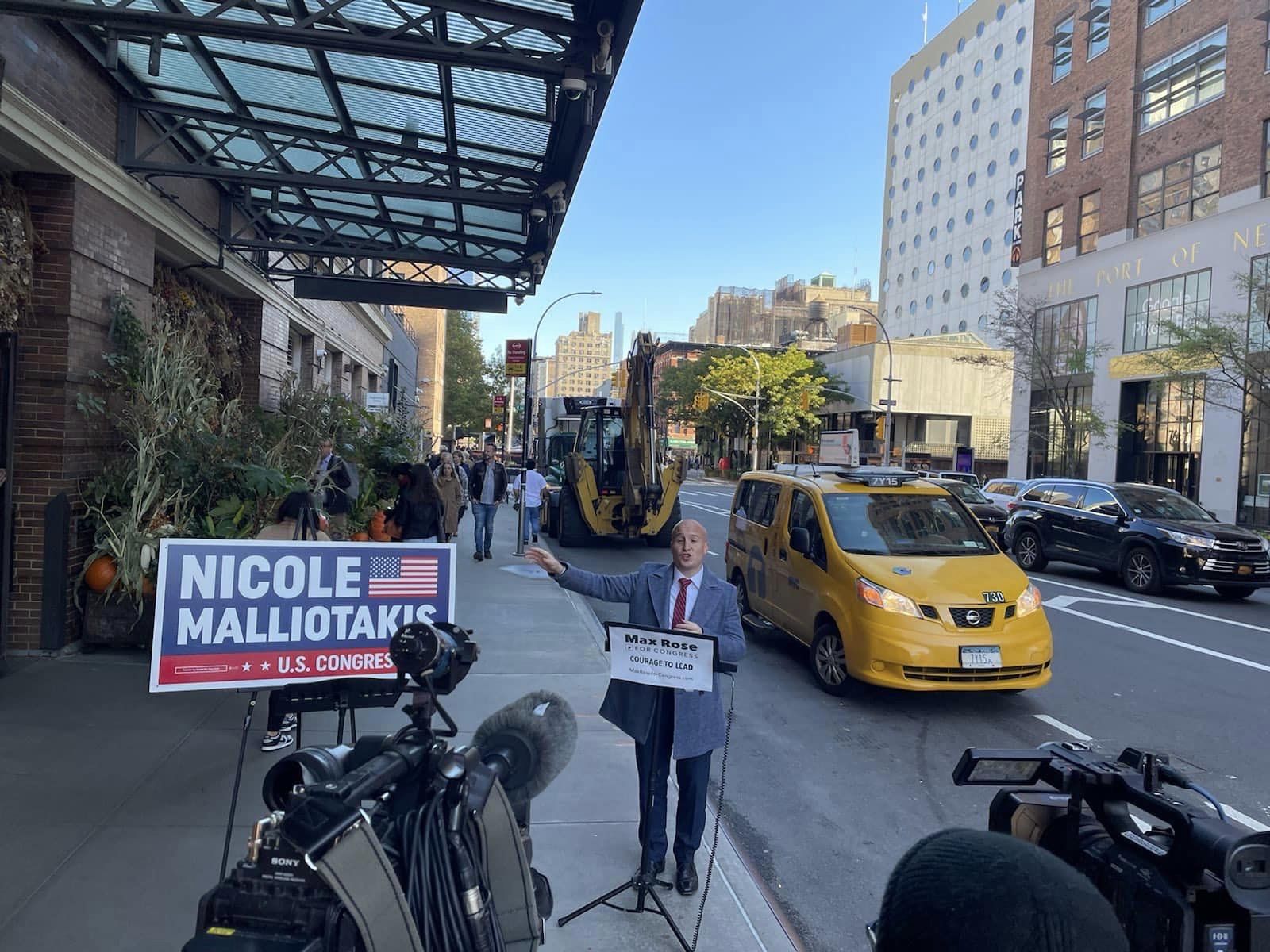
Six points.
In 2018, Democrat Max Rose won the 11th Congressional District seat by six points. In 2020, Republican Nicole Malliotakis took the seat, winning by six points.
With three weeks before the election, Malliotakis is holding on to a six-point lead again.
Pollsters are predicting another single-digit race in the district that includes all of Staten Island and parts of Southern Brooklyn, including Bensonhurst, New Utrecht, Dyker Heights, Fort Hamilton, and parts of Bay Ridge and Gravesend. There is a total population of 776,971 people, 79 percent of whom are of voting age according to REDISTRICTING & YOU: New York.
The nominees have both held congressional office before. Rose represented the 11th Congressional District from Jan. 3, 2019, to Jan. 3, 2021. He ran against Malliotakis the following year. Malliotakis defeated Rose and assumed the position on Nov. 3, 2020. Once again, the two face off in hopes of winning the seat on November 8.
“Malliotakis-Rose II may not pack the punch of Ali-Frazier II but it does present what looks to be another single-digit race between these two in a district that wants Republicans in control of the House by 11 points, dislikes Biden more than Trump, and voted for Trump two years ago – also by six points,” said Siena College pollster Steven Greenberg said.
The Cook Political Report rates the district R+6, meaning the district performed six points more Republican than the national average during voting in the 2016 and 2020 presidential elections. Though the race seems more likely to be in favor of Malliotakis according to the data, Rose has won the same district in the past, putting the race in the national spotlight.
“Advantage, Malliotakis. Rose has an uphill climb, trying to win back those Democrats currently siding with Malliotakis, and reducing his deficit with independents, who currently view him unfavorably and are voting overwhelming for Malliotakis,” Greenberg said. “While midterm elections tend to be worse for Democrats – in terms of turnout and results – than presidential years, Rose won in a midterm and lost in a presidential.
“Six points can be closed in [a few] weeks, but it can also grow in that same time.”
Nicole Malliotakis
Malliotakis is a New York City native; she grew up in Great Kills, Staten Island. Her parents are both immigrants; her father is from Greece, and her mother, Cuba. She attended Seton Hall University for a bachelor’s in communication and then a master’s in business administration from Wagner University.
She then went on to work as a liaison for former Sen. John Marchi and later as a public affairs manager for former Gov. George Pataki. Malliotakis served for five terms in the New York State Assembly and in 2017, ran for mayor alongside incumbent Bill de Blasio.
She is endorsed by nearly every law enforcement and first responder union as well as former President Donald Trump.
Malliotakis sponsored laws that prevent animal cruelty within the state during her time in the State Assembly. She sponsored free care for pets affected by Hurricane Sandy in Congress and bills HR 1448 and HR 1022 so that veterans suffering from war-related disorders such as post-traumatic stress disorder could have emotional support dogs.
As the daughter of immigrants, Malliotakis says she believes in promise of the American dream; however, she does not tolerate illegal immigration and would like to see the American border strengthened. She was involved in a lawsuit to stop New York City from giving undocumented immigrants the right to vote in local elections. During her time in the Assembly, she also voted against laws that would give state tuition and driver’s licenses to those undocumented as citizens.
Malliotakis is working to provide schools with police officers and equipment to keep students and faculty protected. She voted against cashless bail and opposes the defunding of the police. While in Congress, she introduced legislation that municipalities would not qualify for federal funding if they did not prove that their policing departments were being funded.
She hopes to lower taxes for small businesses, fix issues within the public transit system, allow financial coverage for physical and mental medical care for veterans, buckle down on cheat-free voting systems with implementations such as voter identification and safeguards as well as push for education reform.
After Hurricane Sandy hit, Malliotakis encouraged the state to factor in the risk of another future natural disaster, particularly rising sea levels. She helped push the legislation that allowed funding for the East Shore Seawall. Malliotakis is also in favor of reducing greenhouse gas emissions and relying more heavily on renewable energy.
Max Rose
Rose was born in Brooklyn and graduated from Wesleyan University with a B.A. in history. He went on to receive his Master of Social Science from the London School of Economics.
He then enlisted in the U.S. Army and served in the 1st Armored Division full-time for almost five years. He spent 2012 to 2013 as an infantry platoon leader in Afghanistan. Rose was injured when his vehicle hit an explosive during this time. He was awarded the Bronze Star and a Purple heart in recognition of his injury.
After his military service, Rose worked as a director of public engagement and assisted Brooklyn district attorney Kenneth P. Thompson working on the reform of the criminal justice system. He ran for Congress in 2018 defeating predecessor Daniel Donovan (R) and Henry Bardel of the Green Party.

Rose believes the NYPD should refrain from targeting any specific communities suggesting focus on expanding social services in place of police intervention in matters police have not had training in. Rose cosponsored the Justice in Policing Act, which includes the banning of chokeholds by the police, accountability for officers’ actions, and acts as prevention of racial profiling.
Additionally, he has voted for the Marijuana Opportunity Reinvestment & Expungement (MORE) Act, ending federal criminalization of marijuana, was in support of Trump’s The First Step Act for sentencing reform, and was a cosponsor of The Equality Act meant to keep the LGBTQ community safe from prejudice in public spaces.
Some other acts Rose has been involved in include the Women’s Health Protection Act, protecting the right to terminate a pregnancy and the Equal Access to Abortion Coverage in Health Insurance (EACH Woman) Act to ensure affordability for all. He also voted for H.R. 3, which would make pharmaceutical drugs less expensive, and introduced the More Help for Seniors Act, making medication easier to access for lower and middle class seniors.
Rose says one of his main priorities is to combat overdoses in America. During his time in Congress, Max’s bipartisan bill, the Fentanyl Sanctions Act, created sanctions on manufacturers in nations that provide drug traffickers with opioids. He obtained a $140 million increase in funding to fight the epidemic.
He believes in universal healthcare and paid family leave, curbing gun violence, using resources to combat climate change, stopping both foreign and domestic terrorism, making wealthy corporations pay equal taxes, fighting travel bans, and preventing veteran suicide.
For information on how to vote, click here.









